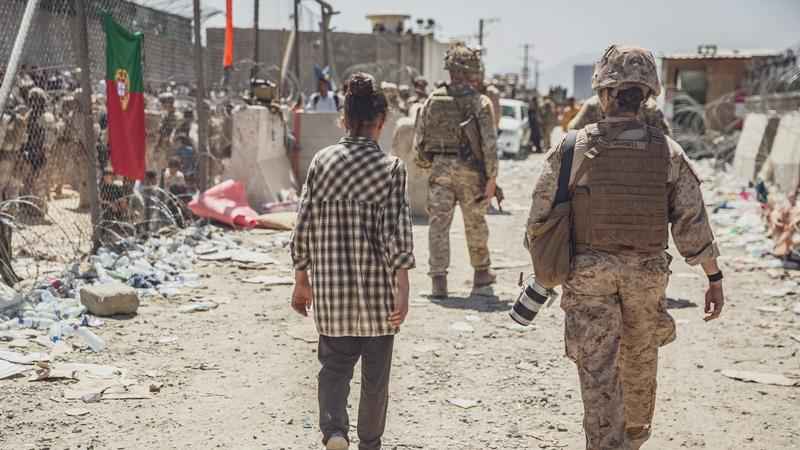Retired Marine, U of M political science expert talk about conditions in Afghanistan
At the airport in Kabul, it’s a frantic and frightening race against time.
"It is a chaotic scene," Cpl. Jon Hansen, a retired U.S. Marine who served in Afghanistan in 2014, said. "Essentially a decision point for all these Afghans is, ‘so I leave everything I have and everything I know for a home of safety somewhere else, away from the Taliban.’"
On Friday, the U.S. military struck back, one day after a suicide bombing killed as many as 169 Afghans and 13 American service members at the Kabul airport.
The U.S. Central Command says it bombed an ‘ISIS-K planner’ — not directly linked to Thursday’s attack.

In this image provided by the U.S. Marine Corps, a Marine with Special Purpose Marine Air-Ground Task Force - Crisis Response - Central Command, escorts a young girl at an evacuation control checkpoint during an evacuation at Hamid Karzai International Airport in Kabul, Afghanistan, Thursday, Aug. 26, 2021.[U.S. Marine Corps photo by Staff Sgt. Victor Mancilla]
Meanwhile, just four days away from a troop withdrawal deadline, several hundred Americans and many more Afghans are struggling to get out of the country.
The Pentagon says more than 5,400 people are inside the airport, awaiting flights.
"I don’t think we can truly grasp the chaos on the ground for these people as they clear multiple Taliban checkpoints to get to the airport, searches to get to the airport, lines to get onto airplanes," Hansen said.
The retired USMC infantry rifleman and assistant patrol leader says he’s most worried about an Afghan friend who worked base security for a private contractor between 2010 and 2014, among thousands trying to leave.
"He was beaten by the Taliban last month for having served in the American military," Hansen declared. "He knows he’s on a list, and if he doesn’t get out of the country, the Taliban is going to hunt him down and find him."
The five-year Marine Corps veteran says the speed of the Taliban advance is shocking.
"It took us all by surprise to see a collapse that many expected to take months, if not years, happen in a matter of days," Hansen noted.
But how much of a surprise was it?
5 EYEWITNESS NEWS spoke with Kathleen Collins, a University of Minnesota political science professor who has studied Islam and politics in the Afghanistan region for years.
"We certainly had intelligence reports coming in and those on the ground, I think, had a good idea of what was actually going on," she said. "The Taliban have been actually advancing since 2016, steadily and slowly taking control of significant portions of the country."
Collins says there’s been intense fighting in many parts of Afghanistan for months, and Thursday’s suicide bombing is a sign things could get worse.
"We are completely losing our intelligence and military bases of operations in Afghanistan," Collins explained. "So we have no long-term regional presence to deal with the terrorist threat, which as we saw yesterday, is, of course, growing in Afghanistan as a result of the U.S. withdrawal."
Both Collins and Hansen believe the civilian population will suffer under Taliban rule.
She also worries about women’s rights, the ability for them to go to school or work without fear.
But Collins’ biggest concern is the growing potential for a civil war.
"We may find out in the coming weeks or months that different factions are actually going to re-arm and reorganize themselves militarily to challenge the Taliban’s regime," she said. "In which case, we are going to see even more bloodshed."
Hansen fears that poverty, violence and crime are going to skyrocket.
Then there’s the lingering question of whether what he fought for in Afghanistan was worth it.
"I think within this post 9/11 veteran community, that’s something we’re going to battle with for the rest of our lives," Hansen said. "You know, the positives and negatives of these wars that have lasted so long. It’s something we’re going to have to wrestle with."